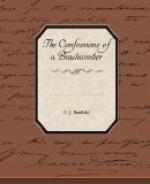Whereas the average town-dweller could not endure the commonplaces of Nature which entertain me, rouse my wonder, enliven my imagination, and gratify my inmost thoughts, so his pursuits are to me devoid of purpose, insipid, dismally unsatisfactory. To one whose everyday admission (apology if you like) is that he is not as other men are—fond of society and of society’s occupations, pastimes, refinements, and (pardon) illusions—the unsoiled jungle is more desirable than all the prim parks and clipped gardens; all this amplitude of time and space than the one “crowded hour.” Here I came to my birthright a heritage of nothing save the most glorious of all possessions: freedom—freedom beyond the dreams of most men in its comprehensiveness and exactitude. These few haphazard notes refer to the exercise of rare independence. They cannot be otherwise than trivial and dull, but they at least fulfil the purpose to which I was pledged. They reveal my puny efforts to be none other than myself. So tranquil, so uniform are our days, that but for the diary—the civilised substitute for the notched stick—count of them might be lost. And this extorts yet another confession. One year, Good Friday passed, and Easter-time had progressed to the joyful Monday, ere cognisance of the season came. Speedy is the descent to the automaton. A mechanical mis-entry in the diary threw all the orderly days of the week into a whirling jumble. We knew not Wednesday from Thursday, nor Thursday from Friday, though we calculated and checked notes of the transactions and traits of successive days. To what purpose was the effort to memorise one day from another when all were precisely alike in colour and uneventfulness? Each day had been blue—radiantly blue—nothing more. And the entries in the diary set at naught dogmatic assertions of disproof. But the steamer cuts a deep weekly notch. We jolted into it and became harmonised once more with the rigid calendar of the workaday world.
Thus we keep the noiseless tenor of our way, finding in life if not great and gaudy pleasures, at least content and relief from many of the vexations that gnaw away the lives of the multitude. Though it was acknowledged a long time ago to be—indecorous—an abominable thing for a man to commend his ways; though his mode of living may not commend itself to others; though it may seem blank and colourless, thin and watery, devoid of expectation, and the hope of fame, name, and that kind of success which comes of the acquirement of riches, yet—and in a spirit of thankfulness be it said—the obscure and minor part the writer plays in the tragic-comedy of life affords gratification. He does what he likes to do. He frankly confesses that he sought isolation because of the lack of those qualities which make for dutiful citizenship, because of indifference to the ordinary enchantments of the kaleidoscopic world, not because of any lack of appreciation of the wisdom of the majority. He has dared to be what he is, rather than submit to be pulled this way and that on the rack of fashion and custom.




